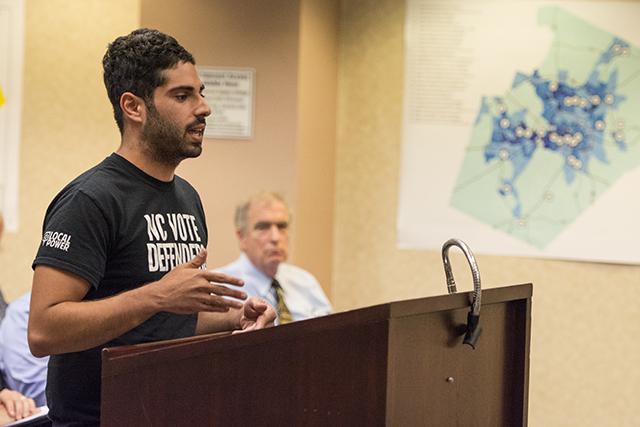Students hoping to cast their ballots in November for Midterm elections won’t be able to vote with the convenience that they had in the 2012 election, as N.C. State will not be hosting an early voting site this fall.
On Tuesday, the Wake County Board of Elections held a public hearing in the WNBC center in downtown Raleigh to pick eight early-voting sites.
The three-man board unanimously voted to approve five voting sites and selected the last three sites by a 2-1 margin. In addition, Wake County is required by law to use the Board of Elections office, which is located downtown.
There were 40 speakers at the meeting, which lasted for about three hours, including students and faculty members from N.C. State and representatives of the NAACP.
Residents who attended expressed frustration as the room did not have a microphone, and it was often difficult to hear what the speakers were saying.
Monika von Windheim, a resident of Wake Forest, said she was proud to have voted with her daughter who attends N.C. State during the early-voting period.
“It was so energizing for our family to vote together and to see our daughter vote for the first time so easily,” von Windheim said.
Those who spoke were most concerned about early-voting sites at N.C. State and Chavis Community Center. In the past, Chavis has attracted a significant population of African-Americans, and has historical significance to the black community.
Supporters of making Chavis a voting site, which included representatives from the NAACP, argued that unlike the Board of Election building, which is not open on Sundays, Chavis can be open after church when many African-American churches conduct voter drives called “Souls to the Polls.”
David Robinson, chairperson of the Wake County Board of Elections and fellow board members Mark Ezzell and Brian Ratledge agreed unanimously on these sites: Optimist Community Center in North Raleigh, Knightdale Recreation Center, Apex Community Center, Herbert Young Community Center in Cary and The Northern Regional Center in Wake Forest.
Together, Robinson and Ezzell voted for Chavis Community Center, Lake Lynn Community Center and Wake Technical Community College’s main campus near Fuquay-Varina by a 2-1 margin.
Robinson and Ratledge decided not to endorse N.C. State, citing its lower voter turnout than other sites and relative difficulty of parking.
Ezzell said he was disappointed N.C. State was not selected as an early-voting site, but he said he was excited to see Chavis was selected. The other early-voting sites are all outside the beltline except for the Board of Election building downtown.
The closest voting stations for students who want to early vote this fall will be Chavis Community Center, which is about 3.6 miles from the heart of campus.
Ezzell, the sole Democrat on the Board, said even two years ago when N.C. State hosted an early-voting site at the Talley Student Union, the Board of Elections did not approve it to do so. That time, one of the Board members appealed the decision to the State Board of Elections, which declared that N.C. State would host a site.
However, Ezzell said he will honor the decision of the Board and will not pursue similar actions.
More than 13,000 people voted at Talley in 2012, the Technician reported.
Stacy Roberts, a graduate student in history, said she was especially disappointed with the Board’s decision and said she did not completely understand its reasoning in reaching its decision.
Roberts said many of speakers who opposed expanding early-voting sites did not understand the difficulty working people would face in attempting to get to the polls.
“They made it seem like public transit is really easy, but the fact public transportation is not as convenient as they made it sound,” Roberts said. “Plus, it’s not just students that would vote here. Faculty, staff and members of the Hillsborough community would play a huge role.
Mike Mullen, Vice Chancellor and Dean of Student Affairs, sent a letter to the Board Tuesday, urging the Board to strongly consider the University as an early-voting site.
“This is important for our students, faculty and staff, and would be a service for the greater community as well,” Mullen wrote. “With over 40,000 people on campus each day, having an early voting location would be an asset for the Wake County Board of Elections.”








